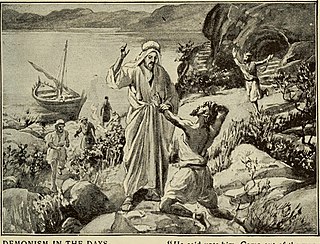Related Research Articles

Matthew 10:2 is the second verse in the tenth chapter of the Gospel of Matthew in the New Testament.
Matthew 11:1 is the first verse in the eleventh chapter of the Gospel of Matthew in the New Testament.
Whoever welcomes a prophet as a prophet will receive a prophet’s reward, and whoever welcomes a righteous person as a righteous person will receive a righteous person’s reward.
Matthew 10:42 is a verse in the tenth chapter of the Gospel of Matthew in the New Testament.
Matthew 9:28 is a verse in the ninth chapter of the Gospel of Matthew in the New Testament.
Matthew 11:29 is the 29th verse in the eleventh chapter of the Gospel of Matthew in the New Testament.

Matthew 9:18 is the 18th verse in the ninth chapter of the Gospel of Matthew in the New Testament.

Matthew 8:14 is the fourteenth verse of the eighth chapter of the Gospel of Matthew in the New Testament. This verse and the following verse constitute a "simple short story" in which Jesus heals Peter's mother-in-law.

Matthew 8:20 is the 20th verse in the eighth chapter of the Gospel of Matthew in the New Testament of the Christian Bible. It reveals the homelessness of Jesus and his followers.

Matthew 10:32 is the 32nd verse in the ninth chapter of the Gospel of Matthew in the New Testament.
Matthew 10:22 is a verse in the tenth chapter of the Gospel of Matthew in the New Testament.

Matthew 10:25 is the 25th verse in the tenth chapter of the Gospel of Matthew in the New Testament.

Matthew 10:27 is the 27th verse in the tenth chapter of the Gospel of Matthew in the New Testament.
Matthew 12:21 is the 21st verse in the twelfth chapter of the Gospel of Matthew in the New Testament.

Matthew 12:42 is the 42nd verse in the twelfth chapter of the Gospel of Matthew in the New Testament.

John 1:41 is the 41st verse in the first chapter of the Gospel of John in the New Testament of the Christian Bible.
Matthew 12:17-18 are two verses in the twelfth chapter of the Gospel of Matthew in the New Testament.

Matthew 12:43-45 is a passage comprising the 43rd to 45th verses in the twelfth chapter of the Gospel of Matthew in the New Testament.
Matthew 12:49-50 are verses in the twelfth chapter of the Gospel of Matthew in the New Testament.

Matthew 15:3-6 is a set of verses in the fifteenth chapter of the Gospel of Matthew in the New Testament.
References
- ↑ Cornelius Cornelii a Lapide; Thomas Wimberly Mossman The great commentary of Cornelius à Lapide, London: J. Hodges, 1889-1896.
- 1 2 3 4 5 "Catena aurea: commentary on the four Gospels, collected out of the works of the Fathers: Volume 6, St. John. Oxford: Parker, 1874. Thomas Aquinas". 1874.
 This article incorporates text from this source, which is in the public domain .
This article incorporates text from this source, which is in the public domain .